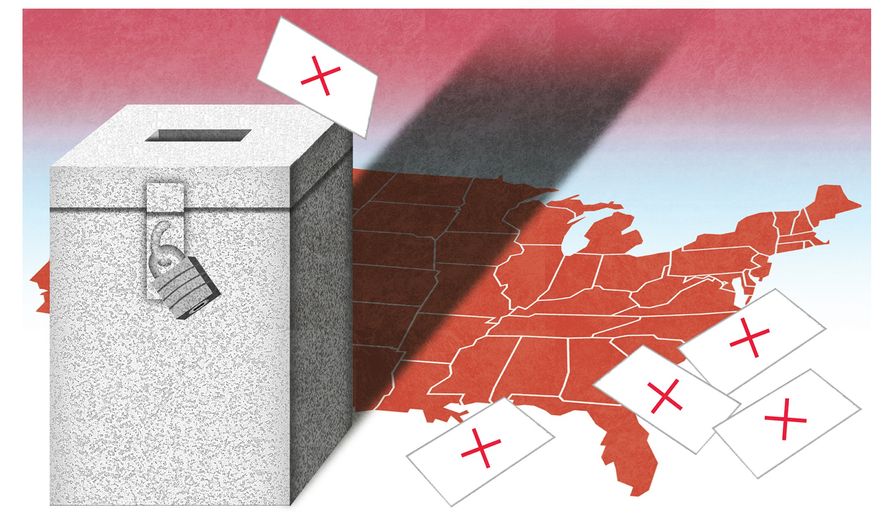OPINION:
The 2022 elections had more deleterious effects than just leaving Team Biden (mostly) in charge of the federal government. The failure of the Republicans to focus their efforts also meant losses at the state level, which in turn have resulted in brand-new terrible outcomes in states now controlled entirely by Democrats.
For example, after winning razor-thin majorities in 2022 in the Michigan House of Representatives (now controlled by the Democrats 56-54) and the Michigan Senate (now 20-18 advantage Democrats), Michigan Democrats are blocking tax relief for Michiganders just one month into the legislative session.
In a state that has one of the highest unemployment rates in the country, whose economy is lagging behind in recovering from the pandemic, and crippling inflation, preventing tax relief is probably exactly the sort of policy voters were hoping for from the new Democratic majorities.
Nevertheless, these new majorities continue to entertain their most destructive impulses and are using a loophole in the legislative process to block an automatic tax cut trigger created by Republicans years ago.
In 2015, then-Gov. Rick Snyder signed a law as part of a road funding deal that lowered Michigan’s income tax rate from 4.25% to 4.05% if the state’s general fund grew faster than the rate of inflation in any year starting in 2023. Michigan’s surplus (now $9 billion) is projected to hit $9.2 billion this autumn, which would trigger the automatic income tax reduction and let Michiganders keep more of their money.
The response from the new Democratic legislative majorities? They are actively trying to drain the surplus by shifting it into a corporate slush fund account or sending out what are essentially one-time welfare checks, all to prevent a modest tax break for Michiganders.
HB 4001 would retroactively divert $800 million in general fund revenue from fiscal 2022 to the Michigan Taxpayer Rebate Fund. That $800 million would go toward sending out a one-time check to Michiganders equal to about 50 cents a day rather than fund real tax relief. The legislation would also divert up to $500 million annually to the Strategic Outreach and Attraction Reserve Fund — essentially a slush fund designed to attract large business projects.
As Rep. Nancy Pelosi, a California Democrat, likes to point out, elections have consequences. Let’s hope the Michiganders who voted for the Democrats to take the Legislature are enjoying these particular consequences.
As always, there is hope. Some Democrats are themselves aware of the optics. House Appropriations Chair Angela Witwer described the proposal as “political suicide,” acknowledging that Democrats could face public criticism if they tried to stop the potential income tax cut. Let’s hope she’s right.
Michigan is not the only newly Democratic-controlled state attempting to raise taxes. In Minnesota, Gov. Tim Walz, who is a more adroit politician than most, has married tax rebates (temporary) with tax increases (always permanent). He wants to impose a sales tax (one-eighth of 1 cent) in the seven-county Twin Cities metropolitan area. The sales tax, which is, of course, the proverbial camel’s nose, would nominally go toward public transportation, including a light rail project.
The governor’s more aggressive proposal is a payroll tax increase of 0.6% to pay for a new statewide paid family leave program. As always with payroll taxes (or any taxes on businesses, really), employers would be the nominal taxpayer, but employees and customers actually pay the tax. Once again, and slightly louder for those in the back of the room: Corporations don’t pay taxes; their customers, employees and shareholders pay taxes.
The disease is pretty much everywhere. In places like Michigan and Minnesota, Democratic majorities are looking at surpluses in state budgets and trying to keep that cash in the government and reset spending baselines higher. In places like West Virginia, Florida and Texas, Republicans are thinking about restructuring the tax regimes so that residents can routinely keep more of their cash.
There’s a reason why people and money are migrating from Democratic-controlled states to states controlled by Republicans.
Let’s hope the people in Michigan and Minnesota come to their collective senses before the stream of refugees begins.
• Michael McKenna, a columnist for The Washington Times, co-hosts “The Unregulated Podcast.” He was most recently a deputy assistant to the president and deputy director of the Office of Legislative Affairs at the White House.




Please read our comment policy before commenting.